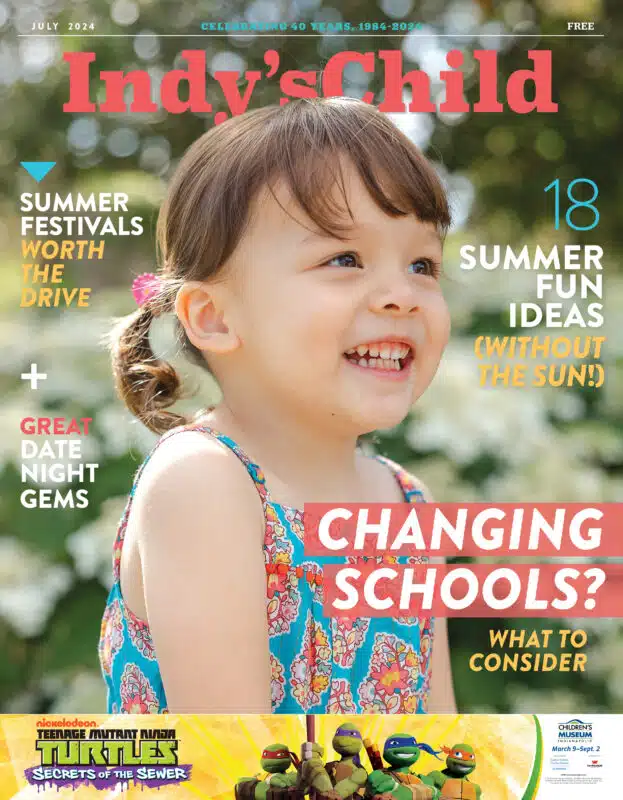For families of children with special needs, the journey from infancy to adulthood often leads down an uncharted road. One Noblesville couple shared their story with Hamilton County Family Magazine to offer a glimpse of their life raising two children on the autism spectrum.
In 1995, Ed and Carin Vittorio welcomed their long-awaited daughter, Grace, into the world. They immediately noticed unusual behavioral symptoms, escalating throughout the following days, weeks and months as they relentlessly sought explanations for what might be a possible cause. Son Christian was born the month Grace turned one, soon exhibiting symptoms much like his sister’s. Grace was eventually diagnosed with autism at 18 months. Christian was diagnosed with PDD-NOS, Pervasive Developmental Disorder-Not Otherwise Specified, an autism spectrum disability. While the pediatric neurologist described their bleak future, the Vittorios began steps to prove him wrong.
Each year, thousands of children in the U.S. receive a diagnosis of autism. It is the fastest growing developmental disability, prevalent in one out of every 88 births. Between 1 and 1.5 million Americans live with an autism spectrum disorder, including: Autistic Disorder, Pervasive Developmental Disorder-Not Otherwise Specified (PDD-NOS), Asperger’s Disorder, Rett’s Disorder and Childhood Disintegrative Disorder. (Source: www.autism-society.org.)
Learning that the optimal intervention window closes at age three, the Vittorios moved quickly. Grace’s first classroom was the bathtub. “She loved water,” says Carin, “and it was the only place I could contain her to focus on flashcards.” Carin contacted specialists around the country, listening to a myriad of suggestions and exploring those which spoke to her heart and instincts. Hippotherapy at Agape in Cicero was critical. “Grace’s first word was ‘horse!'” shares Carin. YMCA swimming lessons led to a major milestone of her first dive off the block. Grace has been diving into swimming competitions ever since with Special Olympics and the Noblesville High School Swim Team. Carin credits special education teachers for their efforts in helping her daughter as well, saying, “They are true warriors rallying against standardized tests and assessment constraints; against all odds, they believe in our children.”
The Vittorios chose to keep Grace and Christian mainstreamed in public school, opting out of the life skills initiatives often recommended for students with autism. “School choice is personal for each family,” says Carin, “we hope to empower our children to live victoriously and capably in this demanding world even when we are no longer by their side.” Whatever educational path is chosen, parental involvement is essential. “Developing good relationships at the school makes a difference. Earn their trust through your willingness to support and appreciate them as they do their job to help every child succeed.” Grace is on track to graduate with a CORE 40 diploma this June, as will Christian next year – a commendable accomplishment for students on the autism spectrum. Achievements such as their driver’s licenses, academic merit awards, athletic participation, public speaking and volunteerism reflect their full lives, defying the once-grim prediction of their first neurologist. Grace proudly displays her 2013 Special Olympics Athlete of the Year award and four swimming medals from the 2010 Special Olympics National Games in Lincoln, Nebraska – which also included her first experience flying and being separated from her parents.
As the Vittorios can attest, the road for families living with autism is not an easy one. Parents face a long and unclear path, with no specific instructions for success. People with autism spectrum disorders endure challenges with inclusion, social acceptance, stress triggers and unyielding expectations. “With young children, every activity requires extreme orchestration, such as preemptively finding businesses and destinations willing to welcome patronage despite the drama autism brings,” says Carin. She describes the situation as a continual balancing act to determine when to push a child without totally stressing them out. “It is a constant challenge to provide the necessary framework in order for them to achieve a sustainable, fulfilling adulthood. We are their narrators and interpreters of this ‘neurotypical’ world – one that expects total conformity. I often wonder if the world would be much better off with a state of mind from their perspective.”
Carin is committed to improving the lives of children with autism by serving on the Executive Board of the Autism Society of Indiana. She is also a 2009 Graduate Partner with Partners in Policymaking Academy and a participatory consultant in the Noblesville High School College/Career Support Services Team. Carin advises parents to tap into all available resources in regards to their child. “The Autism Society has links to specialists and valuable services. Through a support group, we learned the importance of securing the government waiver.” She encourages families embarking on their autism journey to “always have hope and appreciate your child’s courage.” “Keep a good attitude and take one day at a time,” says Carin. “You are not alone. Even the impossible can become possible.”







